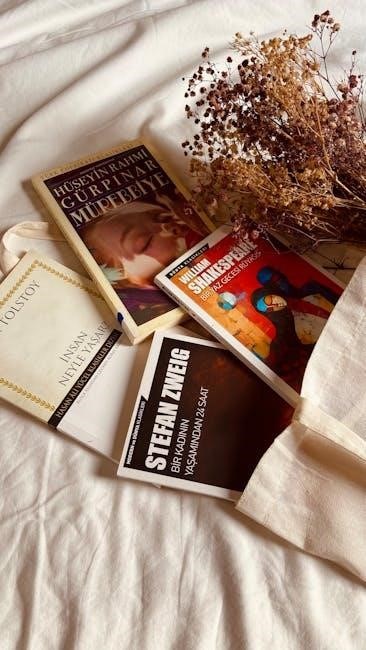Chinua Achebe’s seminal novel Things Fall Apart explores the life of Okonkwo in late 19th-century Nigeria, delving into cultural conflict and colonialism’s impact, a classic of world literature.
Overview of the Novel
Chinua Achebe’s Things Fall Apart, published in 1958, is a groundbreaking novel that explores the complexities of Igbo culture and the devastating impact of British colonialism in late 19th-century Nigeria. The story centers on Okonkwo, a strong-willed and respected Igbo man, as he navigates the challenges of maintaining his cultural identity amidst the encroachment of colonial rule. Set in the fictional village of Umuofia, the novel vividly portrays the traditions, values, and social structures of the Igbo people. Through Okonkwo’s tragic journey, Achebe examines themes of cultural conflict, masculinity, and the inevitable clash between tradition and modernity. The novel is celebrated for its rich storytelling, deep cultural insights, and its unflinching portrayal of the consequences of colonialism on indigenous societies.
Publication and Author Background
Things Fall Apart was published in 1958 by William Heinemann Ltd, marking a pivotal moment in African literature. Its author, Chinua Achebe, was a Nigerian novelist, poet, and critic, whose work has had a profound influence on the literary world. Born in 1930 in Ogidi, Nigeria, Achebe was raised in a traditional Igbo family, which deeply influenced his writing. He studied English literature at the University of Ibadan, later becoming a prominent voice in postcolonial literature. Achebe’s unique narrative style and his ability to blend cultural authenticity with universal themes have made Things Fall Apart a classic of world literature, transcending cultural boundaries and resonating with readers globally.
Cultural and Historical Significance
Things Fall Apart holds immense cultural and historical significance as it vividly portrays life in late 19th-century Nigeria, offering a nuanced exploration of Igbo traditions, colonialism, and cultural clash. The novel challenges stereotypes about African societies, presenting a complex, organized community with its own social structures, beliefs, and values. Achebe’s depiction of the Igbo people’s rich cultural heritage and their resilience in the face of colonial disruption provides a powerful counter-narrative to Eurocentric histories. The novel has become a cornerstone of postcolonial literature, shedding light on the devastating impact of British colonialism on indigenous cultures. Its exploration of identity, tradition, and modernity continues to resonate globally, making it a vital work for understanding colonial histories and their legacies.
The Plot of “Things Fall Apart”
The novel traces Okonkwo’s rise as a respected wrestler and farmer in Umuofia, his accidental killing of a clansman, exile, and the devastating impact of colonialism on his life.
Setting: Time and Place
The novel is set in the late 19th century in the fictional village of Umuofia, part of the Igbo society in what is now southeastern Nigeria. This pre-colonial setting reflects the rich cultural traditions and social structures of the Igbo people, including their religious beliefs, farming practices, and village governance. The story unfolds against the backdrop of a thriving, self-sufficient community, where the characters navigate their complex social hierarchies and spiritual systems. The setting also marks the beginning of British colonial influence, which gradually disrupts the Igbo way of life. Achebe vividly portrays the physical environment, from dense forests to cultivated lands, emphasizing the deep connection between the people and their land. This setting is central to exploring themes of cultural identity and change.
Protagonist: Okonkwo’s Character
Okonkwo, the protagonist of Things Fall Apart, is a complex and dynamic character, embodying the strengths and vulnerabilities of a traditional Igbo man. Known for his physical strength and wrestling prowess, Okonkwo is a respected leader in his community. However, his rigid adherence to traditional masculine ideals, such as valuing strength over emotion, often leads to internal conflict. His determination to avoid the weaknesses of his father, Unoka, drives many of his decisions, yet this same drive contributes to his downfall. Okonkwo’s character represents the struggle between maintaining cultural identity and adapting to change, making him a tragic yet relatable figure in the face of colonial disruption.
The Structure of the Story
The narrative of Things Fall Apart is divided into three distinct parts, reflecting the rise and fall of Okonkwo and the societal changes he endures. The first part introduces Okonkwo’s life in Umuofia, highlighting his achievements and family dynamics. The second part follows his exile to Mbanta, where colonialism begins to disrupt traditional life. The final part depicts the destruction of Okonkwo’s world as colonial forces dominate, leading to his tragic end. This structure emphasizes the contrast between Okonkwo’s earlier triumphs and his later struggles, mirroring the broader clash between tradition and modernity. Achebe’s use of this three-part framework underscores the inevitability of change and the devastating impact of colonialism on indigenous cultures.
Key Events and Turning Points
The novel Things Fall Apart is marked by pivotal events that shape Okonkwo’s life and the fate of his community. Okonkwo’s wrestling match victory establishes his reputation, while the death of Ikemefuna haunts him, symbolizing the consequences of rigid cultural expectations. The arrival of Christian missionaries introduces conflict, as they challenge traditional Igbo beliefs. Okonkwo’s accidental killing of a clansman during a funeral leads to his exile, a turning point that weakens his influence. Upon his return, he finds his village transformed by colonialism, culminating in the hanging of tribal leaders by British authorities. These events underscore the clash between tradition and modernity, leading to Okonkwo’s tragic suicide, a powerful symbol of the disintegration of his world. Each event drives the narrative toward its inevitable conclusion, highlighting the devastating impact of colonialism.
Themes in “Things Fall Apart”
Chinua Achebe’s Things Fall Apart delves into themes of cultural conflict, colonialism, masculinity, tradition vs. modernity, and fate, exploring the tension between heritage and change.
Cultural Conflict and Colonialism
The novel vividly portrays the clash between Igbo traditions and British colonialism, highlighting the disruption of indigenous cultures. Okonkwo’s resistance to colonial rule reflects the broader struggle of his community against imposed Western values. The arrival of British colonizers and Christian missionaries disrupts the social fabric, leading to internal conflicts within the Igbo society. Achebe examines how colonialism erodes cultural identity, as traditional practices are deemed “savage” and replaced with foreign systems. This cultural upheaval is central to Okonkwo’s tragic downfall, as he fails to adapt to the changing world. The novel critiques colonialism’s destructive impact, emphasizing the loss of autonomy and the fragmentation of societal cohesion. It underscores the tension between preserving heritage and embracing modernity.
Masculinity and Identity
Masculinity is a central theme in Things Fall Apart, deeply intertwined with Okonkwo’s identity. Okonkwo’s perception of manhood is rooted in strength, courage, and control, traits he associates with his father’s opposite. His rigid adherence to traditional masculine norms leads to internal and external conflicts, as he struggles to balance societal expectations with personal emotions. The novel examines how toxic masculinity, driven by fear of weakness, shapes Okonkwo’s decisions and relationships. His identity is further complicated by the clash between Igbo traditions and colonial influences, forcing him to confront changing definitions of manhood. Achebe critiques the rigidity of these norms, showing how they contribute to Okonkwo’s tragic downfall and the broader societal fragmentation.
Tradition vs. Modernity
The clash between tradition and modernity is a pivotal theme in Things Fall Apart. Okonkwo’s unwavering dedication to Igbo customs contrasts sharply with the encroaching influence of British colonialism and Christianity. The novel portrays tradition as a cornerstone of identity and community, while modernity, though promising progress, disrupts cultural continuity. Achebe highlights how the imposition of foreign values erodes traditional practices, leading to a loss of cultural autonomy. This tension is not just external but also internal, as characters grapple with adapting to change while preserving their heritage. The novel critiques the notion of modernity as inherently superior, underscoring the resilience of tradition in the face of colonial upheaval and its enduring significance to the Igbo people.
Fate and Tragedy
Things Fall Apart is deeply rooted in the inevitability of fate and the tragic collapse of Okonkwo’s world. Okonkwo’s life is marked by a series of unintended consequences, such as his accidental killing of a clansman during a funeral ceremony, which leads to his exile. His rigid adherence to traditional values and fear of appearing weak contribute to his downfall. The novel portrays tragedy not just as individual misfortune but also as a collective experience, as the Igbo culture itself faces the devastating impact of colonialism. Achebe masterfully weaves fate and tragedy to illustrate the fragility of human life and the irreversible changes brought by external forces, leaving readers with a profound sense of loss and inevitability.
Character Analysis
Okonkwo, the tragic hero, embodies strength and pride, yet struggles with internal vulnerabilities. Ekwefi and Ezinma represent resilience, while Obierika offers rationality, highlighting the complexity of human nature.
Okonkwo: The Tragic Hero
Okonkwo, the protagonist of Things Fall Apart, is a complex figure whose tragic downfall reflects the broader collapse of his culture. His determination to escape his father’s legacy drives him to become a respected wrestler and leader in Umuofia. However, his rigid adherence to traditional Igbo masculinity and his fear of weakness lead to impulsive decisions, such as killing Ikemefuna, which haunt him. Okonkwo’s inability to adapt to the changes brought by British colonialism accelerates his downfall, making him a tragic hero whose fate embodies the destruction of his community and way of life. His story evokes both admiration and sorrow as it highlights the fragility of human pride and tradition.
Unoka: The Father’s Legacy
Unoka, Okonkwo’s father, is a pivotal figure whose legacy profoundly shapes Okonkwo’s identity. A lazy and debt-ridden man, Unoka embodies the opposite of the masculine ideals Okonkwo strives to uphold. His love for music and storytelling contrasts sharply with Okonkwo’s rigid, strength-oriented worldview. Unoka’s failure to meet societal expectations brings shame to his family, driving Okonkwo to overcompensate and reject his father’s gentle nature. Despite his flaws, Unoka’s influence lingers, highlighting the tension between tradition and individual ambition. His legacy serves as a reminder of the complexities of cultural expectations and the lasting impact of parental identity on one’s life choices.
Ekwefi and Ezinma: The Role of Women
Ekwefi and Ezinma, Okonkwo’s wife and daughter, embody the resilience and complexity of women in Igbo society. Ekwefi, Okonkwo’s second wife, is known for her independence and strength, often challenging traditional gender roles. Her relationship with Okonkwo is strained due to his rigid masculinity, yet she remains a source of emotional support. Ezinma, their daughter, is a spirited and determined child who defies societal expectations of femininity. Her bond with Okonkwo is deep, though unspoken, and she symbolizes the potential for change in a patriarchal society. Together, they highlight the struggles and silent strength of women in a culture dominated by masculine ideals, offering a nuanced portrayal of gender dynamics in pre-colonial Nigeria.
Obierika: The Voice of Reason
Obierika, a close friend of Okonkwo, serves as the voice of reason in the novel. His calm and reflective nature contrasts with Okonkwo’s impulsiveness. Obierika often mediates conflicts and offers wise counsel, showcasing his balanced perspective. For example, he questions the killing of Ikemefuna, demonstrating his ability to challenge unjust actions. His empathy is evident when he supports Okonkwo during his exile, providing emotional support. Obierika’s character highlights the value of thoughtful deliberation and compassion in a society dominated by strict traditions. His actions underscore the importance of empathy and wisdom in navigating complex situations, making him a crucial figure in the story.

Historical Context
Things Fall Apart is set in late 19th-century Nigeria, exploring pre-colonial Igbo society and the disruption caused by British colonialism, offering a rich cultural and historical backdrop.
Igbo Culture and Society
Chinua Achebe’s Things Fall Apart vividly portrays Igbo culture and society, highlighting its rich traditions, communal values, and spiritual beliefs. The novel explores the intricate social hierarchy, with elders holding significant influence and decisions made through a council. Achebe delves into the concept of “chi,” or personal destiny, and the importance of masculinity in Igbo society. The story also showcases the role of women, such as Ekwefi, and their resilience despite societal constraints. The Igbo people’s deep connection to their land and ancestors is central to their identity, as seen in their festivals, rituals, and oral traditions. This cultural tapestry provides a backdrop for the protagonist Okonkwo’s struggles and the broader impact of colonialism on Igbo life.
Impact of British Colonialism
The arrival of British colonialism in Nigeria, as depicted in Things Fall Apart, brings drastic changes to Igbo society. The colonizers impose their religion, education, and legal systems, eroding traditional structures. Okonkwo, a respected leader, struggles against these changes, symbolizing the resistance of his people; The introduction of Christianity creates divisions within the community, weakening cultural bonds. The colonial administration’s disregard for Igbo customs and land ownership disrupts the social fabric. This clash of cultures ultimately leads to the downfall of Okonkwo and the fragmentation of his society. Achebe highlights the destructive nature of colonialism, illustrating how it undermines indigenous identities and traditions. The novel serves as a poignant critique of the colonial enterprise and its lasting effects on African societies.
Religion and Spirituality
Religion and spirituality play a central role in Things Fall Apart, shaping the Igbo community’s identity and daily life. The Igbo people believe in a complex pantheon of gods and ancestral spirits, which guide their decisions and cultural practices. Okonkwo’s struggles are deeply intertwined with his spiritual beliefs, as he seeks to honor his ancestors and maintain his reputation. The arrival of Christianity disrupts this spiritual landscape, offering an alternative worldview that challenges traditional beliefs. Through this clash, Achebe examines the tension between indigenous spirituality and foreign religious influences, highlighting how these shifts affect individuals and communities. The novel underscores the significance of religion in defining cultural identity and the impact of its erosion on societal cohesion.

Literary Style and Techniques
Achebe employs a rich, evocative narrative style, blending Igbo oral traditions with modern storytelling. His use of proverbs, folktales, and local dialects grounds the novel in cultural authenticity, while contrasting traditional and colonial perspectives.
Narrative Style and Structure
Chinua Achebe’s Things Fall Apart features a compelling narrative style that blends traditional Igbo storytelling with modern literary techniques. The novel is structured chronologically, tracing Okonkwo’s life from his rise as a respected wrestler to his eventual downfall. Achebe uses a third-person omniscient narrator, offering insight into characters’ thoughts and cultural contexts. The story is divided into parts, reflecting the cyclical nature of Igbo life and the disruptive impact of colonialism. Flashbacks and proverbs enrich the narrative, providing depth and cultural authenticity. This structure allows Achebe to explore themes of tradition, identity, and change, while maintaining a clear and engaging storytelling flow. The novel’s narrative style effectively bridges African oral traditions with universal literary appeal.
Use of Symbolism
In Things Fall Apart, Chinua Achebe employs symbolism to convey deeper meanings and themes. The yam, a staple crop, symbolizes masculinity, strength, and productivity, reflecting Okonkwo’s identity. The egwugwu ceremony, involving ancestral spirits, represents cultural cohesion and spiritual traditions. The novel’s title, inspired by Yeats’s poem, symbolizes the inevitable collapse of order and tradition. Achebe also uses natural elements like the locusts and the changing seasons to foreshadow impending chaos and transformation. These symbols enrich the narrative, highlighting the tension between tradition and modernity while emphasizing the cultural and emotional depth of the Igbo people’s experience under colonialism. Through symbolism, Achebe underscores the novel’s central themes of cultural erosion and personal tragedy.
Language and Dialect
Chinua Achebe’s Things Fall Apart masterfully employs language and dialect to reflect cultural identity and colonial impact. Written in English, the novel incorporates Igbo phrases, proverbs, and idioms, preserving the richness of Igbo oral traditions. This blend enriches the narrative, offering cultural authenticity while making it accessible to a broader audience. The use of proverbs, central to Igbo communication, conveys wisdom and moral lessons, highlighting communal values. The contrast between English and Igbo dialects symbolizes the clash between colonial influences and traditional culture. Achebe’s straightforward prose balances simplicity with cultural depth, creating a vivid portrayal of life in Umuofia. This linguistic approach not only enhances the story’s authenticity but also underscores the novel’s exploration of cultural conflict and identity.

Reception and Legacy
Things Fall Apart is celebrated as a seminal work of African literature, sparking global acclaim and controversial discussions. Its profound impact on world literature remains unparalleled.
Initial Reception and Controversies
When first published in 1958, Things Fall Apart received widespread acclaim for its vivid portrayal of Igbo culture and its critique of colonialism. However, it also sparked controversy, with some critics questioning its historical accuracy and others praising its groundbreaking narrative. The novel’s unflinching depiction of cultural clash and its challenge to Eurocentric perspectives made it a polarizing work. Despite initial debates, the book quickly gained recognition as a landmark of African literature, reshaping global perceptions of colonialism and indigenous cultures. Its controversial reception only heightened its visibility, solidifying its place as a foundational text in postcolonial studies.
Modern Relevance and Adaptations
Things Fall Apart remains a cornerstone of contemporary literature, with its themes of cultural identity and colonialism continuing to resonate globally. The novel has been adapted into films, plays, and even an opera, ensuring its message reaches diverse audiences. Its exploration of masculinity, tradition, and modernity aligns with current sociocultural discussions. Educational institutions worldwide include it in curricula, highlighting its enduring relevance. Digital versions, such as the Things Fall Apart PDF, have made the novel accessible to a new generation of readers. Achebe’s work not only reflects the past but also offers insights into present-day struggles, cementing its status as a timeless classic. Its adaptability across mediums underscores its universal appeal and lasting impact.
Impact on World Literature
Things Fall Apart revolutionized world literature by offering a powerful counter-narrative to colonialist perspectives. Chinua Achebe’s vivid portrayal of Igbo culture challenged stereotypes and enriched global understanding of African experiences. The novel’s success paved the way for other African writers, fostering a literary renaissance. Its exploration of colonialism, identity, and cultural conflict resonates across continents, making it a foundational text in postcolonial studies. The availability of the Things Fall Apart PDF has further expanded its reach, ensuring its ideas continue to influence writers and scholars. Achebe’s masterpiece remains a testament to the transformative power of literature in shaping global perspectives and fostering cross-cultural empathy. Its legacy endures as a landmark work in the canon of world literature.
Chinua Achebe’s Things Fall Apart remains a vital work in world literature, offering profound insights into culture, identity, and colonialism. Its influence continues to grow, making it essential for understanding postcolonial contexts.
Chinua Achebe’s Things Fall Apart is a profound exploration of cultural identity, colonialism, and tradition. The novel centers on Okonkwo, a respected Igbo warrior, as he navigates the challenges of masculinity, family, and societal change in late 19th-century Nigeria. Achebe masterfully portrays the clash between Igbo traditions and British colonialism, highlighting the tragic consequences for Okonkwo and his community. Themes of cultural conflict, identity, and the inevitable decay of traditional values are central to the narrative. Through its vivid storytelling and rich cultural context, the novel provides a powerful critique of colonialism and a nuanced portrayal of African society. Its enduring relevance has solidified its place as a cornerstone of world literature.
Final Thoughts on the Novel’s Importance
Things Fall Apart remains a monumental work in world literature, offering profound insights into the complexities of cultural identity and colonialism. Chinua Achebe’s masterful portrayal of Okonkwo’s tragic journey highlights the resilience and richness of Igbo culture while critiquing the destructive impact of British colonial rule. The novel’s exploration of masculinity, tradition, and modernity resonates universally, making it a timeless classic. Its ability to challenge Western stereotypes of Africa and provide a voice to marginalized communities underscores its enduring significance. Achebe’s work not only preserves Igbo heritage but also serves as a powerful reminder of the consequences of cultural displacement and the importance of understanding history. Its influence continues to inspire readers and writers globally.

Additional Resources
For deeper insights, explore Things Fall Apart PDFs and companion readings, such as analyses of Igbo culture, colonialism’s impact, and Achebe’s literary legacy online.
Where to Find the “Things Fall Apart” PDF
The Things Fall Apart PDF is widely available for download from various online sources. You can find it on popular e-book platforms like Amazon Kindle, Google Books, and Apple Books. Additionally, many academic databases and libraries offer access to the novel in digital format. Some websites provide free PDF versions, though it’s important to ensure they are authorized and respect copyright laws. For a seamless reading experience, consider purchasing the e-book from reputable retailers or borrowing it from your local library. This ensures you support the author and publisher while enjoying this timeless classic.
Recommended Companion Readings
For a deeper understanding of Things Fall Apart, consider exploring companion readings that enrich its themes and context. Chinua Achebe’s essays, such as “The Role of the Writer in a New Nation,” offer insights into his literary philosophy. W.B. Yeats’ “The Second Coming” provides a poetic lens to the novel’s title and themes. Historical texts on British colonialism in Nigeria and studies of Igbo culture, like J.D. Fage’s “A History of Africa,” add depth. Additionally, Nigerian authors like Wole Soyinka and Ben Okri explore similar cultural and colonial themes. These readings enhance the novel’s resonance and broaden its historical and literary significance.
